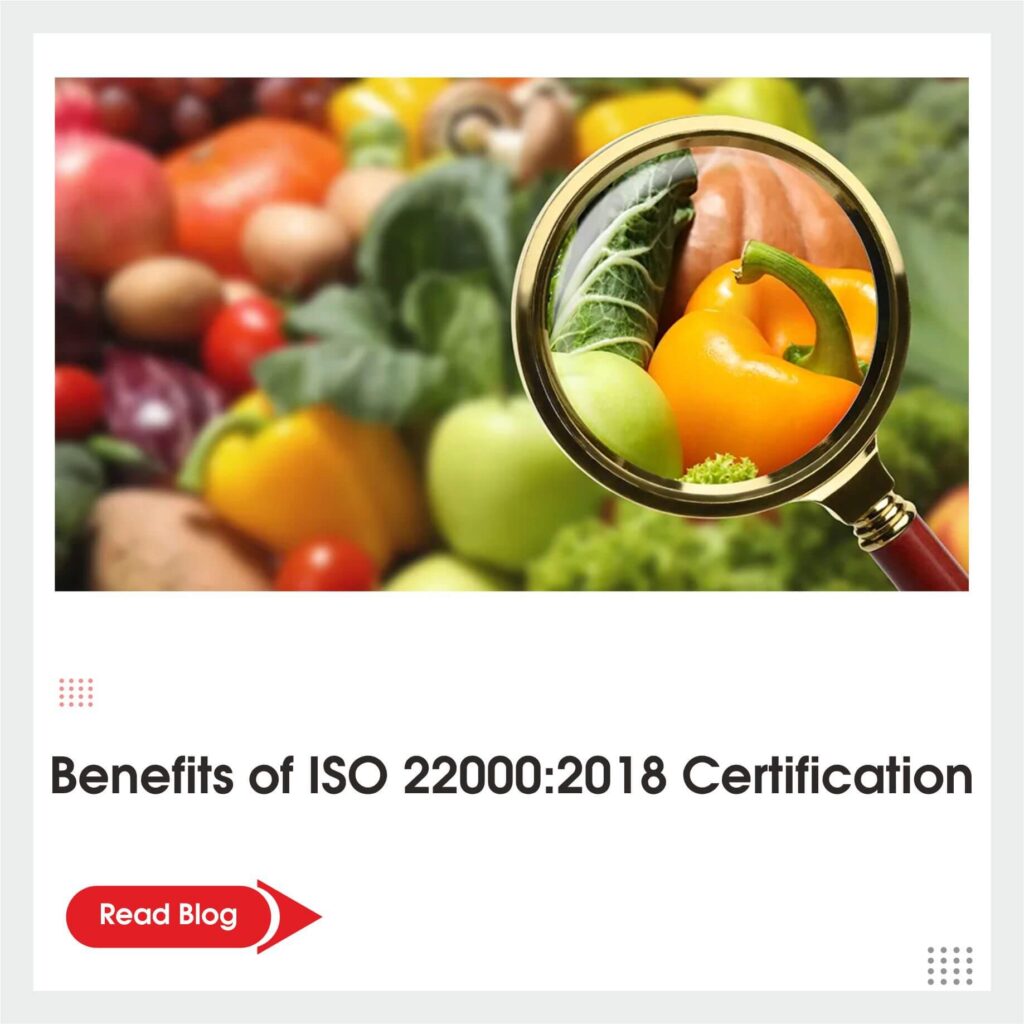Benefits of ISO 22000:2018 Certification

An organisation that operates by the standards created and disseminated by the International Organisation for Standardisation (ISO) can receive ISO Certification. However, an ISO Certification is a kind of endorsement from an impartial third party. The advantages of various ISO Standards and Certifications vary, as an organisation involved in the food chain can implement the Food Safety Management System required by ISO 22000 certification. The advantages of ISO 22000 certification for the food industry are covered in this article. What is ISO 22000:2018 Certification? ⮯ The independent organisation ISO issues ISO Certifications. Furthermore, it exhibits a company’s compliance with any standards established by the International Organisation for Standardisation. It is an independent, non-governmental organisation that brings experts together to share knowledge and create international standards that address pressing global issues. Although promoting trade is its principal objective, process improvement, safety, and quality are also important considerations. ISO 22000:2018 outlines the requirements for the international standard for Food Safety Management Systems (FSMS). Its goal is to assist businesses in the food sector in guaranteeing the safety of their goods. The standard incorporates management standards, prerequisites, and Hazard Analysis and Critical Control Points (HACCP) and covers the whole food chain, from production to final consumption. Businesses with ISO 22000:2018 certification can show their clients and other stakeholders that they have a comprehensive food safety management system. Ways in which a Food Safety Management System (FSMS) helps organisations achieve a safe and sustainable food supply chain ISO 22000 standard is a widely used framework for food safety that assures clients and customers that a particular organisation follows national and international best practices. Moreover, the standard is based on the seven HACCP principles to ensure an effective food safety management system. ISO 22000 and HACCP together assist organisations in identifying and mitigating risks before they endanger the safety of consumers and food. The seven HACCP principles are as follows:-⮯ Hazard Analysis: Hazard Analysis provides a preventive strategy for food safety by identifying physical, chemical, and biological food safety risks during the production process. Critical Control Point: Critical Control Points (CCPs) provide tools and controls for organisations to use at different points in the procedure to lower the risks to a manageable level. Critical Limit: Every CCP has a maximum and minimum value attached to it to define its safety restrictions. It distinguishes between the harmful or unacceptable product and the safe or acceptable product. Moreover, it measures or observes the food supply chain at various levels to identify and eliminate food safety hazards. Monitoring: It monitors all the techniques and procedures to evaluate their impacts and determine the effectiveness of implemented CCP controls. Corrective Actions: In case an organisation finds a shortcoming or deviation from the defined critical limit, it must implement appropriate tools to address them. Corrective actions demonstrate an organisation’s commitment to attain defined results. Verification: It analyses the effectiveness of a food safety management plan. Moreover, the verification process ensures that the implemented plan appropriately covers and identifies all the areas of danger. Record Keeping and Documentation: An organisation must maintain all the records under Record Keeping and Documentation to establish a smooth and flexible checks and balances system. Moreover, it ensures that the organisation complies with the Food Safety Policy and requirements to avoid errors and discrepancies. Some Key Benefits of ISO 22000:2018 Standard ⮯ Organisations can reduce food safety incidents and recalls by developing a food safety management system that satisfies ISO 22000:2018 requirements. Moreover, this will help them better detect and control food safety concerns. The certification provides a robust food safety management system and helps organisations demonstrate their commitment to identifying and eliminating food safety threats and hazards. Moreover, it boosts customer confidence in the security and calibre of the company’s products. Companies certified to ISO 22000:2018 can use their certification as a marketing tool to improve the company’s brand name and its products’ reputations. ISO 22000:2018 is a widely accepted standard that can assist organisations in adhering to national and international rules and regulations concerning food safety. Organisations can find and rectify inefficiencies and enhance overall operations. As a result, it can save extra costs by implementing a food safety management system. It enables businesses to exert more control over their subcontractors and suppliers as it exhibits dedication to adopting international and national best practices. It also results in a safer and more effective supply chain. Conclusion ✅ The efficacy of a food safety management system is contingent upon the organisation’s unique installation and continued dedication to improving the system. Although ISO 22000 certification indicates that an organisation implements a food safety management system that satisfies food safety requirements, it does not guarantee food safety. To maintain the system’s continued efficacy, the organisation must continue to monitor and review it.
